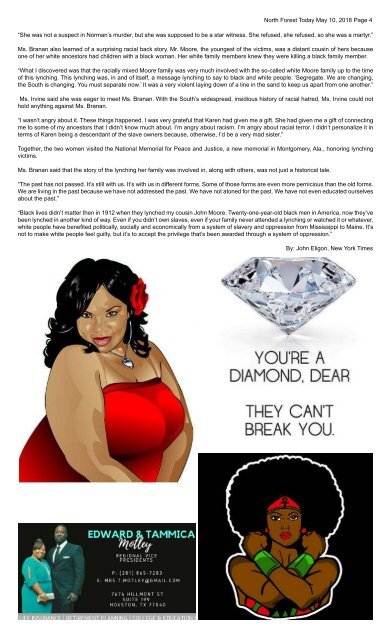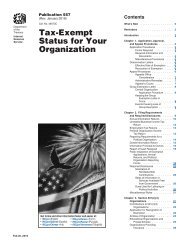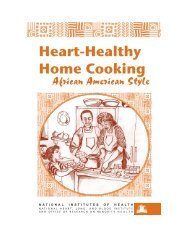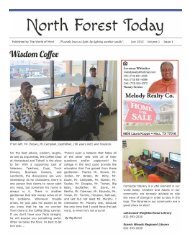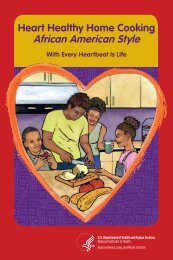The Mighty Anchor
Create successful ePaper yourself
Turn your PDF publications into a flip-book with our unique Google optimized e-Paper software.
North Forest Today May 10, 2018 Page 4<br />
“She was not a suspect in Norman’s murder, but she was supposed to be a star witness. She refused, she refused, so she was a martyr.”<br />
Ms. Branan also learned of a surprising racial back story. Mr. Moore, the youngest of the victims, was a distant cousin of hers because<br />
one of her white ancestors had children with a black woman. Her white family members knew they were killing a black family member.<br />
“What I discovered was that the racially mixed Moore family was very much involved with the so-called white Moore family up to the time<br />
of this lynching. This lynching was, in and of itself, a message lynching to say to black and white people: ‘Segregate. We are changing,<br />
the South is changing. You must separate now.’ It was a very violent laying down of a line in the sand to keep us apart from one another.”<br />
Ms. Irvine said she was eager to meet Ms. Branan. With the South’s widespread, insidious history of racial hatred, Ms. Irvine could not<br />
hold anything against Ms. Branan.<br />
“I wasn’t angry about it. <strong>The</strong>se things happened. I was very grateful that Karen had given me a gift. She had given me a gift of connecting<br />
me to some of my ancestors that I didn’t know much about. I’m angry about racism. I’m angry about racial terror. I didn’t personalize it in<br />
terms of Karen being a descendant of the slave owners because, otherwise, I’d be a very mad sister.”<br />
Together, the two women visited the National Memorial for Peace and Justice, a new memorial in Montgomery, Ala., honoring lynching<br />
victims.<br />
Ms. Branan said that the story of the lynching her family was involved in, along with others, was not just a historical tale.<br />
“<strong>The</strong> past has not passed. It’s still with us. It’s with us in different forms. Some of those forms are even more pernicious than the old forms.<br />
We are living in the past because we have not addressed the past. We have not atoned for the past. We have not even educated ourselves<br />
about the past.”<br />
“Black lives didn’t matter then in 1912 when they lynched my cousin John Moore. Twenty-one-year-old black men in America, now they’ve<br />
been lynched in another kind of way. Even if you didn’t own slaves, even if your family never attended a lynching or watched it or whatever,<br />
white people have benefited politically, socially and economically from a system of slavery and oppression from Mississippi to Maine. It’s<br />
not to make white people feel guilty, but it’s to accept the privilege that’s been awarded through a system of oppression.”<br />
By: John Eligon, New York Times


